#running commentary with miah
Text
finally watching the death cure
@peterspideyy @parkersbliss if i cry it's your fault
51 notes
·
View notes
Text
By any reasonable measure, the neoliberal dream lies in tatters. In 2008 poorly regulated financial markets yielded a world-historic financial collapse. One generation, weaned on reveries of home ownership as the coveted badge of economic independence and old-fashioned American striving, has been plunged into foreclosure, bankruptcy, and worse. And a successor generation of aspiring college students is now discovering that their equally toxic student-loan dossiers are condemning them to lifetimes of debt. Both before and after 2008, ours has been an economic order that, largely designed to reward paper speculation and penalize work, produces neither significant job growth nor wages that keep pace with productivity. Meanwhile, the only feints at resurrecting our nation’s crumbling civic life that have gained any traction are putatively market-based reforms in education, transportation, health care, and environmental policy, which have been, reliably as ever, riddled with corruption, fraud, incompetence, and (at best) inefficiency. The Grand Guignol of deregulation continues apace.
In one dismal week this past spring, for example, a virtually unregulated fertilizer facility immolated several blocks of West, Texas, claiming at least fourteen lives (a number that would have been much higher had the junior high school adjoining the site been in session at the time of the explosion), while a shoddily constructed and militantly unregulated complex of textile factories collapsed in Savar, Bangladesh, with a death toll of more than 1,100 workers.
In the face of all this catastrophism, the placid certainties of neoliberal ideology rattle on as though nothing has happened. Remarkably, our governing elites have decided to greet a moment of existential reckoning for most of their guiding dogmas by incanting with redoubled force the basic catechism of the neoliberal faith: reduced government spending, full privatization of social goods formerly administered by the public sphere, and a socialization of risk for the upper class. When the jobs economy ground to a functional halt, our leadership class first adopted an anemic stimulus plan, and then embarked on a death spiral of austerity-minded bids to decommission government spending at the very moment it was most urgently required—measures seemingly designed to undo whatever prospective gains the stimulus might have yielded. It’s a bit as though the board of directors of the Fukushima nuclear facility in the tsunami-ravaged Japanese interior decided to go on a reactor-building spree on a floodplain, or on the lip of an active volcano.
So now, five years into a crippling economic downturn without even the conceptual framework for a genuine, broad-based, jobs-driven recovery shored up by boosts in federal spending and public services, the public legacy of these times appears to be a long series of metaphoric euphemisms for brain-locked policy inertia: the debt ceiling, the fiscal cliff, the sequestration, the shutdown, the grand bargain. Laid side by side, all these coinages bring to mind the claustrophobic imagery of a kidnapping montage from a noir gangster film—and it is, indeed, no great exaggeration to say that the imaginative heart of our public life is now hostage to a grinding, miniaturizing agenda of neoliberal market idolatry. As our pundit class has tirelessly flogged the non-dramas surrounding the official government’s non-confrontations over the degree and depth of the inevitable brokered deal to bring yet more austerity to the flailing American economy, we civilian observers can be forgiven for suspecting that there is, in fact, no “there” there. For all their sound and fury, these set-tos proceed from the same basic premises on both sides, and produce the same outcome: studied retreat from any sense of official economic accountability for, well, anything.
...You’d think that our recent bruising encounters with the devastating fallout from the deregulators’ handiwork in the housing market of the early aughts should, by rights, render Friedman’s complaints about the public sector’s assaults on market virtue the deadest of dead letters. But, if anything, the ritual defense of the market’s sovereign prerogative has dug in that much more intractably as its basic coordinates have been discredited. As critics such as Dean Baker routinely point out, the stalled recovery out of the Great Recession is almost exclusively a function of the failure of our neoliberal economic establishment to speak honestly about a collapsed housing bubble that created a yawning shortfall in demand—a shortfall that, amid the paralysis of credit markets in the same recession, could be jumpstarted only by government stimulus.
All sorts of absurdities have flowed from this magisterial breakdown in comprehension. Since the neoliberal catechism holds that stimulative government spending can never be justified in the long run, much of our debate over the recovery’s prospective course has been given over to speculative nonsense. Chief among these talismanic invocations of free-market faith is the great question of how to placate the jittery job creators. At virtually every turn in the course of debate over how steeply to cut government spending in this recession, our sachems of neoliberal orthodoxy have insisted that any revenue-enhancing move the government so much as contemplated would spook business leaders into mothballing plans to expand operations and add jobs. It became the all-purpose worst-case scenario of first resort. If health care reform passed, if federal deficits expanded, or if marginal tax rates were permitted to rise for the vapors-prone investor class, why, then the whole prospect of a broad-based economic recovery was as good as shot.[*]
And since neoliberalism is most notably a global—or properly speaking, the globalizing—ideology, such pat distortions of economic reality are no longer confined to the Anglo-American political economy. Nor are they confined to strictly cognitive errors in policymaking. The collapse of the Rana Plaza garment factory in Bangladesh has yielded commentary from neoliberals that might well merit entry into the psychiatric profession’s DSM-5 as textbook illustrations of moral aphasia. Here, after all, was a tragedy that would appall even the darkest Victorian imaginings of a Charles Dickens or a Karl Marx: factory workers earning a monthly wage of $38 crowded into a structurally unsound multistory facility built on a foundation of sand above a drained pond. Three stories of the factory had been hastily erected on top of an already unsound existing structure just to house the fresh battalions of underpaid workers demanded by bottom-feeding international textile contractors.
Government inspectors repeatedly demanded that the facility be shuttered on safety grounds, but the plant’s proprietors ignored their citations, reckoning that the short-term gains of maintaining peak production outweighed the negligible threat of a fine or safety citation. Nor was there likely to be any pressure from Western bastions of enlightenment and human rights. The ceremonial stream of Astroturf labor-and-safety-inspecting delegations from Western nations made zero note of the cracked and teetering foundations of the Rana Plaza structure. Lorenz Berzau, the managing director of one such industry consortium (the Business Social Compliance Initiative), primly told the Wall Street Journal that the group isn’t an engineering concern—and what’s more, “it’s very important not to expect too much from the social audit” that his group and other Western overseers conduct on production facilities. And, as Dave Jamieson and Emran Hossain reported in the Huffington Post, labor organizers have long since learned that the auditing groups serve largely as pro forma conduits of impression management for consumer markets in the West. The auditing of manufacturing facilities in the developing world “ends up catering more to the brands involved than the workers toiling on the line,” Jamieson and Hossain write.
Yes, factory owners and managers well understand the permissible bounds of discourse in such Potemkin-style inquiries—and instruct their workforce accordingly. “What to say to the auditors always comes from the owners,” a Bangladeshi line worker named Suruj Miah told the two reporters. “The owners in most cases would warn workers not to say negative things about the factories. Workers are left without a choice.” Sumi Abedin, one of the survivors of an earlier disaster—a factory fire in the nearby Tazreen plant that claimed the lives of 112 workers in November 2012—told the Huffington Post that on the day of an international audit team’s visit, management compelled workers to wear T-shirts designating them as members of a nonexistent fire safety committee, and had them brandishing prop fire-extinguishing equipment that plant managers had procured only for the duration of the audit.
What this disaster ought to have driven through the neoliberal consensus’s collective solar plexus is something close to the polar opposite of its cherished, evidence-proof theory of the captive regulator: a largely cosmetic global watchdog effort funded overwhelmingly by private-sector concerns, far from delivering oversight and accountability, has incentivized fraud and negligence. And conveniently enough, it’s the race-to-the-bottom competitive forces unleashed by the global workplace that ritually sanctify all of this routine dishonesty. In their malignant neglect of worker safety measures, local factory managers are able to cite the same market pressures to maximize production and profit that have prevented the ornamental Western groups conducting audits of workplace safety practices from releasing their findings to the workers at risk of being killed by the neoliberal regime of global manufacturing.
Still, the dogmas of neoliberal market prerogative are far sturdier than a collapsing factory or a raging fire on the production line. If the dogmatists have thrown overboard Hayek-era intellectual values like experimentation and skepticism, at least they can stave off their inevitable extinction by shoring up Friedman-era platitudes and, from the mantles of the nation’s most prestigious universities and op-ed shops, try to pass them off as the nation’s highest common sense. So former University of Chicago law professor Richard Epstein, who helped found the influential law and economics movement that essentially transposed the shibboleths of public choice theory into legal doctrine, has patiently explained that the just and measured response to the collapse of Rana Plaza is to seek enforcement of preexisting building codes across the Bangladeshi private sector. Writing on the heels of the disaster, in the Hoover Institution’s web journal, Defining Ideas, Epstein takes pains to rule out the passage of any “new laws” to improve worker-safety standards or international monitoring efforts.In other words: Bangladeshi workers can either be more safe or starve more rapidly.But lest even this minimal recourse to regulation sound like too heady a plunge into statist remedies, Professor Epstein also cautions that the aggrieved and grieving workers in the Bangladeshi garment trade must not veer recklessly into unionism or other non-market-approved modes of worker self-determination. After all, he reasons, “in order to stave a shutdown off by improving factory safety, the savvy firm will have to raise its asking price from foreign purchasers . . . and may have to lower wages to remain competitive.” (This is another classic myth of the neoliberal faith—the rational “trade-off” between personal safety and wages that the independent broker makes when he or she contracts with an employer to freely exchange time and skills for wages. Only, of course, the notion of such rational choice has been reduced to a bitter farce in workplaces such as Rana Plaza, where the basic human rights of workers are only acknowledged theatrically, for the purposes of Potemkin auditing tours.) A more activist approach to the crisis in global worker safety would create intolerable distress to Epstein’s utopian vision of the carefully calibrated relations of global market production. Sure, the EU might ban exports of clothes bearing the taint of labor exploitation—but such a measure would just perversely create “undeserved economic protection” for EU economies that are net clothing exporters (and by implication, would deprive consumers of the sacred right to the cheapest possible attire that bullied and undercompensated labor can provide).
Neoliberalism, the Revolution in Reverse
9 notes
·
View notes
Photo

Top Ten Tuesday 19 January 2021
Welcome to this weeks Top Ten Tuesday. Originally created by The Broke & The Bookish, which is now hosted by Jana @ That Artsy Reader Girl. Each week it features a book or literary themed category. This weeks prompt is:
Books I Meant to Read In 2020 but Didn’t Get To
(You could take this opportunity to tell us what’s left on your seasonal TBRs from last year. Or books you were super excited about and then you didn’t get to them.)

A Springtime Affair by Katie Fforde
It’s the season of new beginnings for Helena and Gilly.
Gilly runs her own B&B business from her much-loved family home, which she doesn’t want to part with – at any price.
But that’s before she meets handsome estate agent Leo, and soon she begins to wonder whether selling up might not be such a bad idea after all.
Meanwhile Gilly’s daughter Helena has a budding romance of her own. A talented weaver, she’s becoming very close to her new landlord, Jago, who’s offered to help her at an upcoming craft fair.
It’s what friends do, and they are just friends. Aren’t they?
With spring in full bloom, Helena and Gilly begin to ask themselves the same question:
Might their new loves lead to happily ever after?
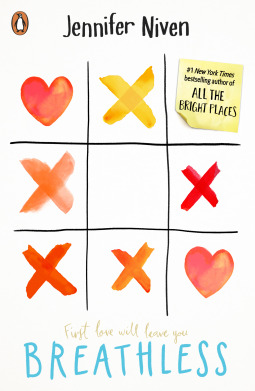
Breathless by Jennifer Niven
Before: With graduation on the horizon, budding writer Claudine Henry is making plans: college in the fall, become a famous author, and maybe–finally–have sex. She doesn’t even need to be in love. Then her dad drops a bombshell: he’s leaving Claude’s mother. Suddenly, Claude’s entire world feels like a lie, and her future anything but under control.
After: Claude’s mom whisks them away to the last place Claude could imagine nursing a broken heart: a remote, mosquito-infested island off the coast of Georgia. But then Jeremiah Crew happens. Miah is a local trail guide with a passion for photography–and a past he doesn’t like to talk about. He’s brash and enigmatic, and even more infuriatingly, he’s the only one who seems to see Claude for who she wants to be. So when Claude decides to sleep with Miah, she tells herself it’s just sex, nothing more. There’s not enough time to fall in love, especially if it means putting her already broken heart at risk.
Compulsively readable and impossible to forget, Jennifer Niven’s luminous new novel is an insightful portrait of a young woman ready to write her own story.

Meet me in London by Georgia Toffolo
What do you do when your fake engagement starts to feel too real…
Aspiring clothes designer Victoria Scott spends her days working in a bar in Chelsea, and her evenings designing vintage clothes, dreaming of one day opening her own boutique. But these aspirations are under threat from the new department store opening at the end of her road. She needs a Christmas miracle, but one is not forthcoming.
Oliver Russell’s Christmas is not looking very festive right now. His family’s new London department store opening is behind schedule, and on top of that his interfering, if well meaning, mother is pressing him to introduce his girlfriend to her. A girlfriend who does not exist. He needs a diversion. Something to keep his mother from interfering while he focuses on the business.
When Oliver meets Victoria, he offers a proposition: pretend to be his girlfriend at the opening of his store and he will provide an opportunity for Victoria to showcase her designs. But what starts as a business arrangement soon becomes something more tempting, as the fake relationship starts to feel very real. But when secrets in Victoria’s past are exposed will Oliver walk away, or will they both follow their hearts and find what neither knew they were looking for…
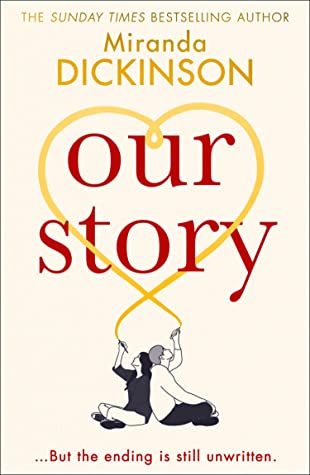
Our Story by Miranda Dickinson
Otty has just landed her dream job. She’s about to join the writing team of one of the most respected showrunners in TV. And then the night before her first day, she’s evicted from her flat.
Joe has been working with Russell for years. He’s the best writer on his team, but lately something has been off. He’s trying to get his mojo back, but when his flatmate moves out without warning he has other things to worry about.
Otty moving into Joe’s house seems like the most obvious solution to both their problems, but neither is prepared for what happens next. Paired together in the writing room, their obvious chemistry sparks from the page and they are the writing duo to beat. But their relationship off the page is an entirely different story, and neither of them can figure out why.
And suddenly the question isn’t, will they, or won’t they? It’s why won’t they?
An epic and modern love story for our times, we will all see ourselves reflected in Otty and Joe. We are our own biggest barriers and this novel explores what happens when we get out of our own way. And it is glorious.

The Summer Villa by Melissa Hill
Three women. One summer reunion. Secrets will be revealed…
Villa Dolce Vita, a rambling stone house on the Amalfi Coast, sits high above the Gulf of Naples amid dappled lemon groves and fragrant, tumbling bougainvillea. Kim, Colette and Annie all came to the villa in need of escape and in the process forged an unlikely friendship.
Now, years later, Kim has transformed the crumbling house into a luxury retreat and has invited her friends back for the summer to celebrate.
But as friendships are rekindled under the Italian sun, secrets buried in the past will come to light, and not everyone is happy that the three friends are reuniting… Each woman will have things to face up to if they are all to find true happiness and fully embrace the sweet life.
An epic summer read about food, friendship and the magic of Italy, perfect for fans of Mary Kay Andrews and Susan Mallery.

A Home from Home by Veronica Henry
Sunshine, cider and family secrets…
Dragonfly Farm has been a home and a haven for generations of Melchiors – arch rivals to the Culbones, the wealthy family who live the other side of the river. Life there is dictated by the seasons and cider-making, and everyone falls under its spell.
For cousins Tabitha and Georgia, it has always been a home from home. When a tragedy befalls their beloved great-uncle Matthew, it seems the place where they’ve always belonged might now belong to them…
But the will reveals that a third of the farm has also been left to a total stranger. Gabriel Culbone has no idea why he’s been included, or what his connection to the farm – or the Melchiors – can be.
As the first apples start to fall for the cider harvest, will Dragonfly Farm begin to give up its secrets?

Ask Again, Yes by Mary Beth Keane
How much can a family forgive?
A profoundly moving novel about two neighboring families in a suburban town, the bond between their children, a tragedy that reverberates over four decades, the daily intimacies of marriage, and the power of forgiveness.
Francis Gleeson and Brian Stanhope, two rookie cops in the NYPD, live next door to each other outside the city. What happens behind closed doors in both houses—the loneliness of Francis’s wife, Lena, and the instability of Brian’s wife, Anne—sets the stage for the explosive events to come.
Ask Again, Yes is a deeply affecting exploration of the lifelong friendship and love that blossoms between Francis and Lena’s daughter, Kate, and Brian and Anne’s son, Peter. Luminous, heartbreaking, and redemptive, Ask Again, Yes reveals the way childhood memories change when viewed from the distance of adulthood—villains lose their menace and those who appeared innocent seem less so. Kate and Peter’s love story, while tested by echoes from the past, is marked by tenderness, generosity, and grace.
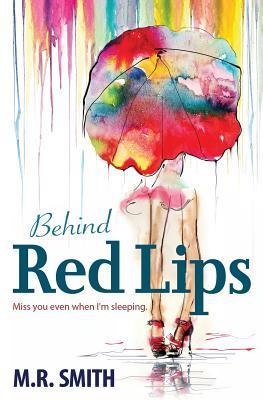
Behind Red Lips by M R Smith
Her confidantes are a rubber duck and a diary she calls Rajah. She tiptoes on the edge of the love cliff, but to her an imaginary love life is safer than taking the plunge with a real one. She dreams about men who remind her of her long lost love, Mason, yet when she bumps into him she panics and runs away.
Her heart crushed by a long-ago betrayal, Charlotte cannot find happiness unless she confronts the ghosts of her past and deals with the realities of the present.
This touching love story wends its way through the ups and downs of Charlotte’s life as she tries to deal with her emotional problems and find a way to heal her broken heart.
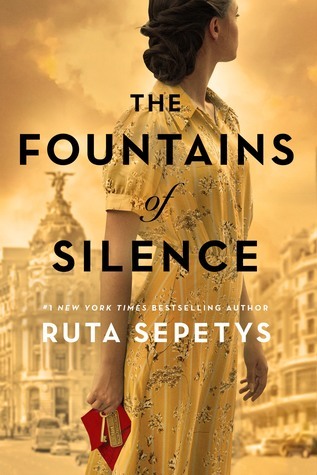
The Fountains of Silence by Ruta Sepetys
A portrait of love, silence, and secrets under a Spanish dictatorship.
Madrid, 1957. Under the fascist dictatorship of General Francisco Franco, Spain is hiding a dark secret. Meanwhile, tourists and foreign businessmen flood into Spain under the welcoming promise of sunshine and wine. Among them is eighteen-year-old Daniel Matheson, the son of an oil tycoon, who arrives in Madrid with his parents hoping to connect with the country of his mother’s birth through the lens of his camera. Photography–and fate–introduce him to Ana, whose family’s interweaving obstacles reveal the lingering grasp of the Spanish Civil War–as well as chilling definitions of fortune and fear. Daniel’s photographs leave him with uncomfortable questions amidst shadows of danger. He is backed into a corner of difficult decisions to protect those he loves. Lives and hearts collide, revealing an incredibly dark side to the sunny Spanish city.
Includes vintage media reports, oral history commentary, photos, and more.
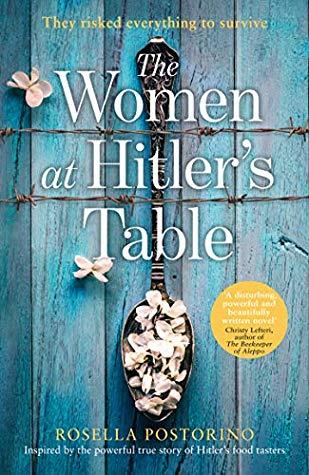
The Women at Hitler’s Table by Rosella Postorino
Inspired by the powerful true story of Margot Wölk, this is a heartbreaking and gripping historical novel for fans of The Tattooist of Auschwitz and The Beekeeper of Aleppo
East Prussia, 1943. Hitler hides away in the Wolfsshanze – his hidden headquarters. The tide is turning in the war and his enemies circle ever closer.
Ten women are chosen.
Ten women to taste his food and protect him from poison.
Twenty-six-year-old Rosa has lost everything to this war. Her parents are dead. Her husband is fighting on the front line. Alone and scared, she faces the SS with nothing but the knowledge every bite might be her last.
Caught on the wrong side of history, how far is Rosa willing to go to survive?
Until next week.
#JustForFun, #Top Ten Tuesday, #TopTenTuesday, #TTT
0 notes
Text
The contested history of the Olympic Games.
An overview into the development and impact of the Olympic Games throughout history.
“The Olympic idea and its realization have evolved greatly since the first modern Games in Athens 1896.” (Girginov 2010 P. 1) Throughout this blog post I will be reflecting upon the development and impact the Olympic games have had throughout history. This blog will explore the Ancient Olympics to the Modern Olympics, the medias involvement, Women involvement in the Olympics throughout history and the London 2012 Olympics.
Ancient Games VS Modern Games
We begin the exploration on the history of the Olympics by examining the Ancient and Modern Olympic games, highlighting the key similarities and differences. “The Ancient games were different from the Modern Games in a number of ways. While some of these differences are clearly apparent, others are much more subtle or less well known.” (Miah and Garcia 2012, P.3). We will begin with the Ancient Olympics, while the date of the first Olympic games is widely contested, the first recorded games took place in 776 BC at Olympia in the Greek city-state Elis, but it is indicated that the ancient Olympic games may have existed for several years before this date (Miah and Garcia 2012). They took place in the heart of Peloponnese at the sanctuary of Olympia every four years and were “religious celebrations that unified the states and were held in honour of the Greek Gods, a belief system which was shared by people in all religions” (Miah and Garcia 2012, P.2.) Each game honoured one specific God and in the case of Olympia is was Zeus. Initially there were two competitions in the Ancient Olympics; the Stadion (sprint) and the dolichos (long distance race) but later a number of events were added such as; wrestling, boxing, horse and chariot racing and military competitions. The pentathlon was the introduced in 708 B.C, this consisted of a foot race, long jump, discus, javelin throw and wrestling. All competitors in the Ancient Olympics tended to represent wealthy families or were ranked in top-ranking-military, all accomplishments from the winners were chronicled and used as a muse for songs so that they could be remembered by future generations. To symbolise their victory, they would receive palm tree branches and a crown made from olive leaves, however there were no rewards for second and third place, it was only first place that mattered, as most contestants competed as a way to show off their muscular physique and strength. Moreover, there was no quantative data record keeping of the results (Miah and Garcia 2012) In 393 A.D the Roman Emperor Theodosius I, abolished the games as part of his efforts to supress paganism within the Roman Empire.
Conversely, the Modern Olympic Games were much different. The first Modern Olympic Games took place on the 6th April 1896, in Athens, Greece by Pierre De Coubertin and here the International Olympic Committee (IOC) was formed. Fourteen nations participated in the first Modern Olympics compared to only 100 Greek cities in the ancient Olympics and a whopping 207 countries taking place in the most recent 2016 Olympics held in Rio. Much like the Ancient Olympics, the Modern Olympics takes place every 4 years and each time a different country is chosen to host. The Modern Olympics is primarily used to earn pride for your country and could be debated that athletes still participate to show their strength and muscular physique much like the Ancient Olympic games. “Today’s games involve 26 international sports federations, with approximately 36 disciplines and 302 events” (Miah and Garcia 2012 P.4) compared to only 5 sports in the Ancient Games. All events in the Ancient Olympics are still included in the Modern Olympics but are slightly adjusted. One of the main differences from the Ancient to Modern Olympics is the rewards. There are 3 sets of medals awarded, Bronze (3rd), Silver (2nd) and Gold (1st) compared to the palm tree branches in Ancient times. “Whereas in modern times they record result stems and rely on comparisons between athletes and across nations, in order to establish a hierarchy and selection system for international competitions.” (Miah and Garcia, 2012, P. 7). “One of the most important aspects of how we make sense of the Ancient and Modern Games today is in terms of their status as more than just sports competitions… the sports competitions are still only one part of the Olympic Games Programme. This highlights the fact that, as in the case of ancient times, todays Olympic games should be regarded as a cultural festival, rather than just a sports event” (Miah and Garcia 2012, P. 8)
How has the media developed and impacted the history of the Olympics from 1989-2016?
“The Olympic movement has gained significantly from its long association with mass media”. (Jackson, 1989, P. 1-5). The Olympic Games are and have always been a subject of current influence. “I would like to begin by emphasizing the importance of the mass media in transforming the nature of physical activity in the modern world. I would argue that the mass media’s production and distribution of reports, information and commentary on sports have been integral to two of the most important developments of the twentieth century- the triumph of sports overall other approaches to physical activity and the interrelated triumph of the Coubertin Olympics over Modern games.” (Jackson, 1989, P. 1-3) The media plays a huge part within the Olympics, from advertising and promoting the upcoming event’s to updating the nation on the newest scores and which country is where on the table, to showing live events and highlights from each day. Without the media, the Olympics would not be as much of a prestigious event as it is to this day. “The television helped transform the Olympics from a household to a household favourite” (Jackson, 1989, P. 1-5) There has always been a high demand of publicity for the games and “According to the contemporary accounts, at the first Olympic Games in Athens in 1896, a dozen journalists reported on the sports competitions including 208 competitors from 13 countries” (Verdier, 1989, P. 34.) In 1896, when the first modern Olympics took place, the opening ceremony had approximately 80,000 spectators compared to the 105,000 at the 1932 Olympics in Los Angeles, California, just after the invention of the Television in 1927, where the Olympics would have been advertised, compared to the 2016 Olympics in Rio, where there were approximately 26.9 million viewers watched BBC’s coverage. “So many now witness, through the television, the opening ceremonies, in which large and small national communities march into the stadium with equal status” (Jackson, 1989, P. 1-5). These statistics are a prime example of how the media can have such a massive impact on the Olympic games, from who watches it to who participates. The media also has a massive impact on following athletes and keeping the world up to date with them, using them as role models to the world. Social media platforms are fast in growing and majority of athletes/ new websites use them as a place to promote and advertise the Olympics and keeping them up to date on a social media level rather than through the news or actually watching the event. “The media’s endless fascination with the Olympic events and athletes has enormously aided Coubertin’s successors and followers in recruiting more and more people, social strata, and communities to their activities.” (Jackson, 1986, P. 1-5).
Women’s involvement in the Olympics 776 B.C -2016.
Women were not allowed to participate in any events in 776 B.C, in fact only single women were allowed to watch, and those who were not single and were caught watching faced a death penalty. However, the Priestess of pemeter, Goddess of fertility, was given a privileged position next to the stadium altar. Women however were allowed to run 160m foot races in the Olympic stadium but they were not a part of the Olympic games and were shorter than the men’s 190m. When equestrian events were added, women were allowed to own competing chariot teams and individual horses, but they could not ride the horses or guide the teams themselves. When Pierre de Coubertin launched the modern Olympics in 1896 he incorporated the ancient tradition of preventing women from track and field events, but this ban was lifted in the Amsterdam Games in 1928. After Germanys Lina Radke collapsed that year, following her gold-medal run of the 800metres, women were banned from all races over 200m. These restrictions were not lifted until the 1960 games in Rome, from then on Women’s participation in the Olympics began to rise. “Happily, the number of Women competing in Atlanta in 1996 will be a record of 4,000. Though this is only 60% of the number of men” (Eaton, 1996, P. 30)
Women’s Participation growth in the Olympics, every 12 years.
Year
Hosts
Women participated
1960
Rome
611
1972
Munich
1,059
1984
Los Angeles
1,566
1996
Atlantis
2,704
2008
Beijing
4, 637
2020
Tokyo
An overall estimation of 12,000 is expected to compete, if only 40% of those contestants are women 4,800 women will be competing.
In London 2012 Olympic games 4,776 women participated, this was the first year where every participating country included females and so did every sport.
While in 776 B.C Women were not allowed to even participate, in London 2012 Olympics Jessica Ennis, one of the biggest upcoming athletes was responsible for one of the most iconic moments in Olympian History. The then 26-year-old, took home the Gold Medal for the heptathlon, which indeed includes a 200m run much like the ancient Olympic games did. This alone is surely enough proof, that throughout history women have massively succeed.
Was London 2012 the best Olympics ever?
“As much as it would please me simply to answer in the affirmative, I know such a response would be premature. My reply is always the same: let history be the judge.” (Rogge, 2012). While there are many debates about what the best Olympic games were, London 2012, is most defiantly a contender. Up to 180,000 spectators a day entered the park to observe and enjoy the games, while there were 10,768 athletes participating overall, with 302 events in 26 sports. They held events in the Olympic stadium, aquatics velodrome and bmx, as well as the hockey, handball and basketball arenas. “The use of other prestigious venues – such as Wembley Stadium for football, the All-England Club in Wimbledon for tennis, Lord’s Cricket Ground for archery and Horse Guards Parade for beach volleyball – was also a feature of the London 2012 Olympic and Paralympic Games.” (Olympic.org, 2012). Countries around the world began to credit the London Olympics “These Olympics had Sydney's vibrancy, Athens's panache, Beijing's efficiency, and added British know-how and drollery," (Baum, 2012)
In total 953 medals were won overall at London 2012, including 300 gold, 299 silver and 354 bronze, compared to 927 in total, 300 gold, 300 silver and 327 bronze at the Sydney 2000 Olympic games and 941 in total, 297 Gold, 296 Silver, and 346 Bronze at the 2008 Beijing Olympics. All three Olympic games considered the best in history. However, we cannot base the success of the Olympic games on just how many medals and who won what, there are many other factors to consider. Such as the spectators and live coverage, spoken about in the above.
Conclusion
All in all, I would say that the development and impact of the Olympic Games throughout history, has established due, women’s involvement and the media due to the new technology available to athletes and the broadcasters. The media also played a great role in commercialisation, because of the live recordings on TV. Also, athletes have become stars in their own right and their fan base has promoted and supported their sporting success, increasing mass participation in a variety of sports, where by young children will now aspire to reach the same achievements.
Reference list.
Miah, A and Garcia, B, (2012), The Olympics: The basics, Routledge, Oxon.
Girginov. V, (2010), The Olympics: A critical reader, Routledge, Oxon.
Jackson. R, (1989), The Olympic movement and the mass media: Past, present and future issues, Hurford Enterprises LTD, Canada.
Verdier. M, (1996), OFFICAL Olympic companion: The complete guide to the Games, Oxprint designs, Oxford.
Baum, G (2012), The verdict: its been a right bang-up job,(The Sydney morning Herald) [online] Available http://www.smh.com.au/olympics/news-london-2012/the-verdict-its-been-a-right-bangup-job-20120812-242we.html#ixzz23PvfIPBq [accessed 20th May 2017].
Olympic.org, (2012), Highlights of the games [online], Available https://www.olympic.org/london-2012 [accessed 21st May 2017].
0 notes
Text
the good think about staying home cause i'm sick is that i can finally watch the afh stream
so yeah, i've been crying for an hour and a half
like first of all this is done amazingly, charlie lightning really smashed it, no lie
hélène is the new love of my life, i just wanna hug the living daylights out of her for everything she's done for louis
the band is fucking amazing and that instrumental solo in fearless sounded like angels coming out of my tv
the crowd looking gayer than a pride parade makes me incredibly proud to know that this is not only thanks to louis, but that he knows we love and support him and that we're as brave and fearless as we are thanks to him
"only you lot can hear [copy³] once and know it that fucking well!" well, we've kinda been streaming it non stop since you first sang it so it's more like hearing it a million times but go off i guess
jho is making me fucking bawl. that song's been saving my life for four years and hearing him perform it will never not make me emotional
to everyone that was there, i'm so happy for you and thank you for letting him know how much we love him and SCREAMING the "come so far from princess park" line
this was supposed to be a short thing, but like all things in my life, it's turning into a running commentary so i'm sorry in advance
CHANGE IS NEXT YAY I ACC HAVEN'T HEARD IT BEFORE
i've been avoiding it like the plague until i had time to watch the livestream so
okay i already love it
the way the arena went quiet cause we know we need a clean version lmaooooooo
OOOOH THAT HIGH NOTE ON "cAAALL ON mEEEE" just about killed me, it was so clean
"if you need you can call on me, i'll be the friend you need, everything's changed outside, but i feel the same inside" PLS CAN YOU SEE MY TEARS
everyone's crying in the audience and looking at him with literal heart eyes and tbh same
those instrumental solos are so fucking good
this song is gonna be perfect for everything, like i can study to it, i can listen to it on the bus, i can scream it at the top of my lungs
"hold it, i'm talking" you're such a DIVA
"i'm looking around and obviously none of you know the words" give it two more listens and we'll be good, don't you worry
DEFENCELESS DEFENCELESS DEFENCELESS
"got so much to ✨lose✨" music asmr for my overworked brain
the "oh oh oh oh oh" with the instruments, and the music, and the audience >>>>> every fucking thing else
he must be having the time of his life on stage i'm so proud of him omg my baby boy i'm having a proud mama moment even though this guy's like 11 years older than me but i don't give a single flying fuck i love him so much
i need a shower to wash the salt off my face, i cried a little too much these last few songs
YAY BEAUTIFUL WAR I LOVE THIS ONE
it took me an embarrassing amount of time to figure out that the reason the drums sounded like they were making different notes is cause there must be someone playing bass but i jusy can't see them cause i'm too focused on louis and Hot Guitar Guys
oh there's the one playing bass
i think
oh give me a break i'm sleep deprived and high on pain meds
idk if i miss his long hair or dig the short hair, but either way he looks gorgeous and i love him and i want that shirt
i should watch this with my louis and play a drinking game
drink everytime he curses
we'll end up smashed but it's worth it
LITTLE BLACK DRESS OH MY GOD
IDK IF I'M FREAKING OUT CAUSE WE'LL GET A LOUIS VERSION OF IT OR IF I'M CRYING CAUSE WE DIDN'T GET A LARRY CATWALK MOMENT BUT EITHER WAY OH MY FUCKING GOD
i wanna kiss and kill whoever thought it'd be a good idea to have these many instrumental solos
kiss them cause they sound amazing
but kill them cause i'm slowly falling in love with Matt The Bassist and i don't have the mental stability to handle yet another crush on a white man but damn if he doesn't look hot with that thing in hand
like between matt dinnadge and victoria de angelis and calum hood i'm really just a hoe for bassists huh
FOR EVERY QUESTION WHY YOU WERE MY BECAUSE
i don't know who the violin girl with shoulder-length hair is but ma'am please marry me
louis taking shots is hilarious PLEASE the cough and immediate drink of water made me laugh so hard
THROUGH THE DARK YAY
even if you screeeeaaaaam and shout *cue video of liam screaming cause louis poured water down the back of his shirt*
*affectionately flips fans off🥰*
he loves us so much and that makes me so happy
this fandom is honestly amazing, from the love we get from him to the love we have for each other. it's like a fucking found family and we all know how much i love those. i love you guys🤍
hélène really wasn't lying when she said he'd sound the best he ever did
this show was 50% louis asking the crowd to sing and i'm not sven mad cause the pure happiness on his face hearing his songs being yelled back at him is too good. it's like he's surprised that we love those songs with all our hearts like of course we do they're fucking masterpieces
this is getting increasingly incoherent but who cares
DON'T KICK THE CAMERA THOSE ARE EXPENSIVE
kmm was the best song to end the show
louis and his band jumping around in happiness >>>>>>
"let's go have a DRINK!!!" god i wish but i'm on antibiotics
"oh fuck me man" i mean i'm sure we can arrange something, i'd have to check if harry's good with it, maybe we'd have to turn it into a threesome but i'm good with that
louis & hélène are my new friendship otp
louis with his family >>>>>>>>>>>>>>>>
"they're so loud" well i mean we learned from you, Mr Loud Loud Loud
the tommo sisters are eating pizza and now i want some too
i wish i could hug hélène, she's so amazing
"i've got these lot behind me, who the fuck's gonna stop us?" FUCKING NOBODY THAT'S WHO
i'm off to cry now, bye y'all
i'm so glad i have this downloaded cause this is the only thing i'll be watching for the rest of my life
4 notes
·
View notes